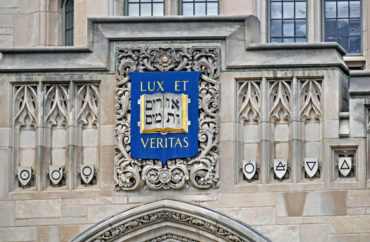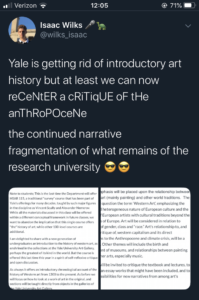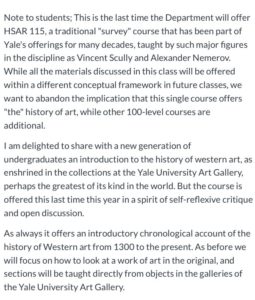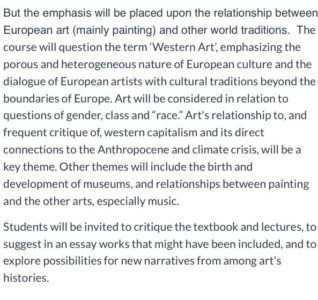
Dean, department chair, art history faculty ignore repeated requests for comment
Yale University has apparently deemed a longstanding history class focused on Western art problematic and may have abolished it from future course catalogs.
History of Art 115 “Introduction to the History of Art: Renaissance to the Present,” an introductory art history course at Yale University that covered the history of western art going back to the 1300s, will no longer be taught in its traditional format, according to a series of screenshots shared by a Yale student on Twitter.
Isaac Wilks shared the screenshots earlier this month, calling it the “continued narrative fragmentation of what remains of the research university.”

It is not known what communique the screenshots are from. The College Fix sought to speak to Wilks via Twitter and by emailing the Yale Politic, the student publication Wilks lists in his Twitter bio, but neither request was returned.
The Fix also sought comment from Yale over a period of 14 days seeking to verify the contents of the screenshot, but received no response. It sent several emails to and left voicemails for the university media team, Yale College Dean Marvin Chun, the course’s current professor and department chair Tim Barringer, and every other faculty member in the department.
As a last-ditch effort, The Fix sent a Facebook message to the History of Art Department Tuesday afternoon. (The university has historically not responded to Fix queries.)
The images tweeted by Wilks purport to be a message to students from someone in the department. It informs them that the HSAR 115 class will no longer be offered, even though it’s been taught “for many decades … by such major figures” as Vincent Scully, who died two years ago, and Alexander Nemerov, who now chairs the same department at Stanford.
The course’s contents will instead be “offered within a different conceptual framework in future classes.”


MORE: Yale University censors ‘hostile’ historic artwork
The course was canceled the message says, in order to “abandon the implication that this single course offers ‘the’ history of art, while other 100-level courses are additional.”
The author of the message says that as the course is taught for a final time, it will be done so in a “spirit of self-reflexive critique and open discussion,” while noting the expansive collection of western art housed within the Yale University Art Gallery.
This is not the first time Yale has taken a censorious tone with art.
Its officials censored a stone carving outside the university’s library that showed a puritan and a Native American, both of who are armed. Some said the puritan was aiming his gun at the Native American.
The school announced at the time that it would be eventually remove the carving and make it available for “study and viewing” while providing accompanying written material to place it in proper historical context.
But a Fix investigation in early August 2019 revealed that the school had simply placed a wooden box around it – spraypainted in Yale blue – and has not made it available for viewing.
But while the art history course is being taught for a final time, the author of the message shared by Wilks said that this final edition of the course would be one that would place emphasis on the “porous and heterogeneous nature of European culture and the dialogue of European artists with cultural traditions beyond the boundaries of Europe.”
The course, the author says, will also focus on “art’s relationship to, and frequent critique of, western capitalism and its direct connections to the anthropocene and climate crisis.”
MORE: Yale’s controversial stone carving remains censored
IMAGE: Spiroview Inc/Shutterstock
Like The College Fix on Facebook / Follow us on Twitter





Please join the conversation about our stories on Facebook, Twitter, Instagram, Reddit, MeWe, Rumble, Gab, Minds and Gettr.